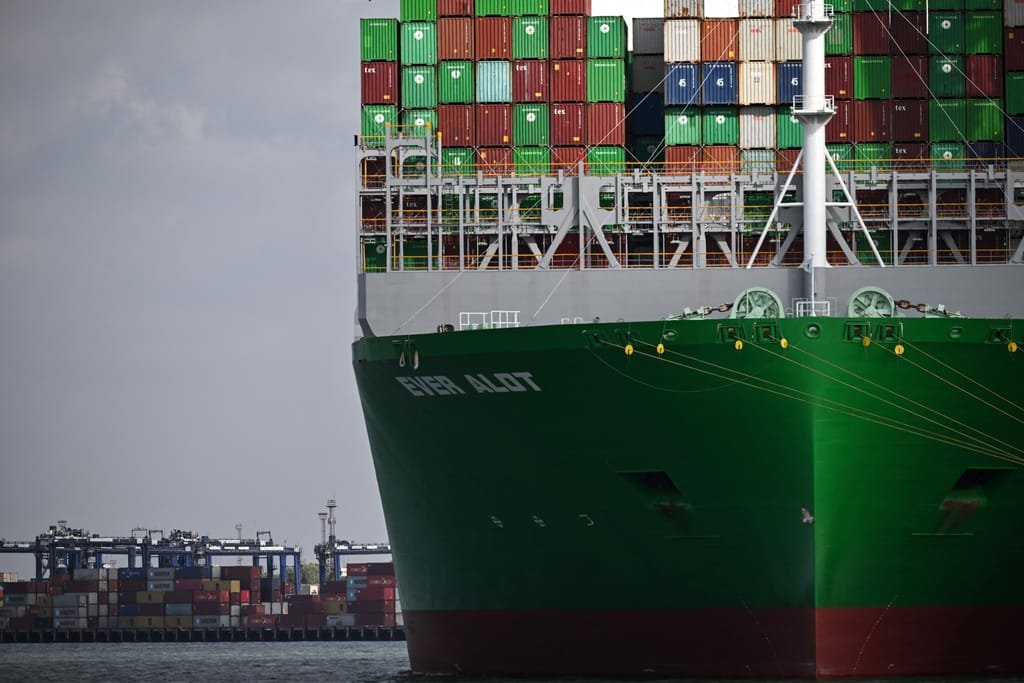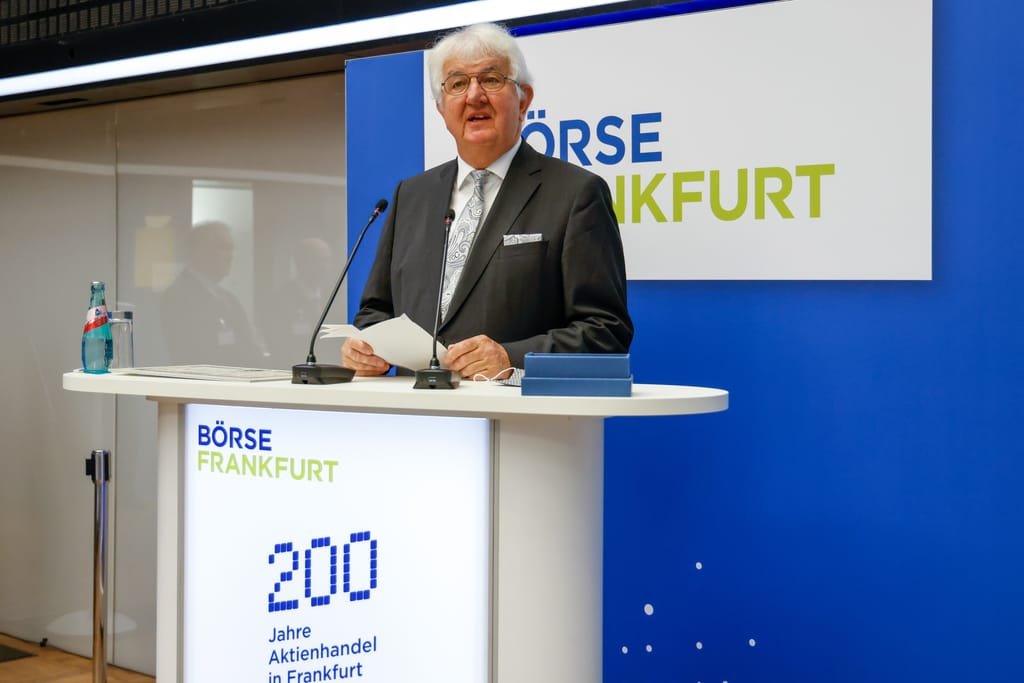As they head to the Swiss Alps for this year’s World Economic Forum, EU leaders are anxious over Trump’s trade saber-rattling and their China-reliant economies.

BRUSSELS — European leaders are flocking to Davos for the annual World Economic Forum this week — and their speaking engagements offer an insight into their state of mind.
Betraying the anxiety stoked by their flailing economies and Donald Trump’s second term in office are panels on the topics of “Europe: Finding the Money,” “Debating Tariffs,” “How to Project Europe’s Power,” and “Diplomacy amid Disorder.”
Trump is pushing the Europeans into making a lose-lose choice.
Option 1: Bend to his will and fully “decouple” from their reliance on Chinese goods — which will test unity among the 27 European Union countries and the Brussels institutions, trigger likely retaliation from Beijing and further stunt their stuttering economies. Option 2: Leave Trump to go it alone on China — which will test EU27 unity, could trigger the United States into slapping tariffs on European goods, and, you guessed it, further stunt their stuttering economies.
“Have we entered into a period of time when it is survival of the fittest?” mused French Foreign Minister Jean-Noël Barrot earlier this month. “My answer is yes.”
The problem is, even Europe’s fittest may not survive.
Governments across the EU are facing both political and economic turmoil, struggling to get economic engines revving as empty coffers, burdensome bureaucracy, high interest rates and a cost-of-living crisis slow down the corporate innovation (and consumption) that is crucial for their businesses to compete against Chinese and American rivals.
The EU’s two top economies are at the epicenter of the problem.
France has had four different prime ministers in just one year, amid a budget impasse and ballooning deficit, and is hurtling toward an economic crisis. Germany, facing its own budget crisis, has recorded shrinking gross domestic product for the second year running (unprecedented in the last two decades), dragging the rest of the EU down with it. Its deeply unpopular leader, Chancellor Olaf Scholz, was forced to call a snap February election that he’s almost certain to lose.
Germany and France (along with other countries such as Italy and Ireland) are also squarely in Trump’s sights as he threatens to impose tariffs on everything from cars to booze and pharmaceuticals in response to their trade surpluses with the U.S.
And it won’t just be tariffs on European goods that threaten the EU’s economic interests.
If Trump follows through on his vow to impose universal 60 percent tariffs on Beijing, that would likely reshape global trade flows, leading to a flood of cut-price Chinese products being dumped in the EU — a death knell for its already struggling manufacturing powerhouses.
Mirek Dušek, the managing director of the World Economic Forum, said “forces of fragmentation that are playing out and influencing geoeconomic relations, geopolitical relations,” are squarely on both the official and unofficial agenda in Davos, where many European leaders will gather to parse over the world’s problems (and drown their sorrows) over the coming week.
“There is widespread consensus that we have moved into a more competitive, geostrategic, geoeconomic environment. We are seeing shifts around supply chains, shifts around trade flows. That whole landscape is being reshaped,” Dušek said.
Herding cats
There’s another scenario that has the Europeans worried: After getting a reluctant EU onside with his anti-Beijing agenda, the famously fickle Trump could U-turn and end up ganging up on the bloc with his “very, very good friend” Xi Jinping, China’s president.
There’s precedent for that: In 2020, after years of escalating hostility during Trump’s first term in office, Washington and Beijing struck a mini trade deal aiming to increase U.S. exports to China and to ease their trade war.
Now, Trump has billionaire China dove Elon Musk in his ear — and he needs Washington to retain good ties with Beijing to keep his electric vehicle company Tesla afloat.
That has the EU worried that if it does break with China, an eventual rapprochement between Beijing and Washington could see the continent stuck out on a very shaky limb.
Luisa Santos, the deputy director general at the biggest EU corporate lobby group BusinessEurope, said the Europeans are alive to the “possibility that there is an agreement at some point, probably after tariffs are introduced, between the U.S. and China.
“That’s why we need to tread very carefully when it comes to China policy at this stage, because we don’t really know if there will be a continuation and possibly an even more assertive policy vis-à-vis China — or whether at one point Trump will have some sort of agreement with China.”
The Beijing tightrope
Treading carefully on China is difficult when the EU is neither clear nor united on which path to tread.
On the one hand, the European Commission under President Ursula von der Leyen has taken a more hawkish stance on China, and it calls the shots on trade policy. Brussels has taken several hostile steps targeting Beijing, including imposing duties on imports of subsidized EVs, launching a series of trade defense probes against China in the last year and pushing EU capitals to screen foreign investment in sensitive tech.

On the other hand, some EU countries, such as Germany, Hungary, Spain and Slovakia, don’t want to anger China, on which their economies heavily rely, and have sought to curb the Commission’s economic security ambitions.
In an apparent olive branch to Beijing just days before Trump’s inauguration, António Costa, the president of the European Council (which represents the interests of the EU member countries’ governments), agreed with Xi to hold an EU-China summit in Brussels in early May.
So much for unity among the EU’s institutions, let alone its 27 governments.
“The EU is already stuck in a very difficult position between the U.S. and China. It’s trying to have some sort of a middle-ground approach toward China compared to the U.S.’s more hawkish position,” said Agathe Demarais, a geoeconomics senior policy fellow at the European Council on Foreign Relations.
“Under Trump, we can definitely expect a hardening of U.S. positions vis-à-vis China. At the same time, this will put the EU in a very difficult position because de-risking isn’t exactly happening. The EU is just as reliant on China as it used to be. It’s actually more reliant on China in some sectors,” she added.
Complicating matters further is next month’s German election, which could see Berlin join the Commission (and Paris) in the China hawks camp. Germany’s likely next chancellor, Christian Democrat Friedrich Merz, takes a more critical stance on Beijing than incumbent Scholz or his predecessor Angela Merkel, and wants Brussels and Washington to revive a trade deal abandoned a decade ago.
Divide and conquer
These EU divisions are music to Trump’s ears.
The Republican has long railed against EU bureaucracy and sought to deal with countries bilaterally, shunning Brussels.
Despite the EU’s protestations that it comes as part of a package deal, a string of European national leaders including Italian Prime Minister Giorgia Meloni and Hungary’s Viktor Orbán made the journey to kiss Trump’s ring at his Mar-a-Lago home base after he won the November U.S. election. Meanwhile, Trump has snubbed Commission President von der Leyen’s attempts to secure a meeting.

It’s an early indication of how some Trump-friendly leaders will try to appeal directly to the U.S. president for mercy, leaving their counterparts elsewhere to fend for themselves.
“The fact that the United States is trying to disunite us is nothing new; it always has been the case,” said a senior EU official, granted anonymity to speak candidly. “Americans are not the biggest fans of the European Union. China also does it all the time.”
The official added: “We need to stick together better.”
In the age of Trump 2.0, that’s going to be an even tougher task.




